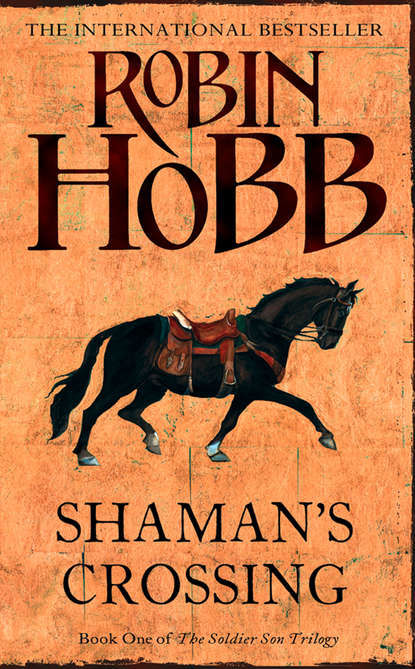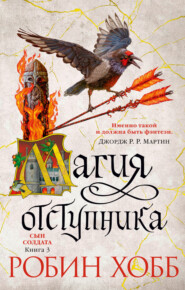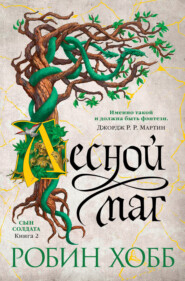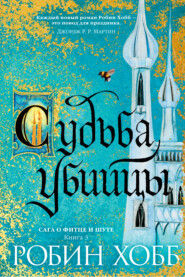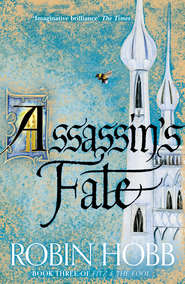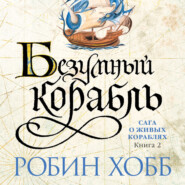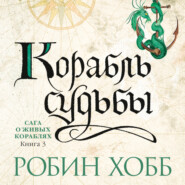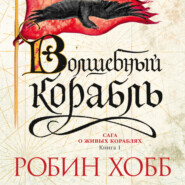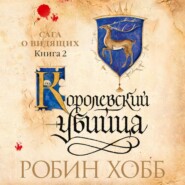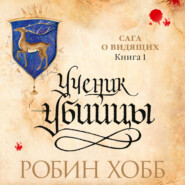По всем вопросам обращайтесь на: info@litportal.ru
(©) 2003-2024.
✖
Shaman’s Crossing
Автор
Год написания книги
2019
Настройки чтения
Размер шрифта
Высота строк
Поля
My father was gathering momentum as he spoke. I am sure he did not realize that he had raised his voice. His words carried clearly to my ears.
‘With the Specks, it is even more true. They are a slothful people, too lazy even to have a culture of their own. If they can find a dry spot to sleep at night and dig up enough bugs to fill their bellies by day why, then they are well content. Their villages are little more than a few hammocks and a cook fire. Little wonder that they have all sorts of diseases amongst them. They pay such things no more mind than they do to the shiny little parasites that cling to their necks. Some of their children die, the rest live, and they go on breeding as happily as a tree full of monkeys. But when their diseases cross over to our folk, well … Well, then you have just what you have heard from that scout: an entire regiment sickened, half of them like to die, and the plague now spreading among the women and children of the settlement. And probably all because some low-born conscript wanted something a bit stranger or stronger than the honest whores at the fort brothel.’
My brother said something I could not quite hear, a query in his voice. My father gave a snort of laughter in reply. ‘Fat? Oh, I’ve heard those tales for years. Scare stories, I think, told to new troopers to keep them out of the forest edge of an evening. I’ve never seen one. And if the plague indeed works so, well, then, good. Let them be marked by it, so all may know or guess what they’ve been doing. Perhaps the good god in his wisdom chooses to make an example of them, that all may know the wages of sin.’
My brother had risen and followed my father to the sideboard. ‘Then you don’t believe,’ and I heard the caution in my brother’s voice, as if he feared my father would think him foolish, ‘that it could be a Speck curse, a sort of evil magic they use against us?’ Almost defensively, he added, ‘I heard the tale from an itinerant priest who had tried to take the word of the good god to the Specks. He was passing through the Landing on his way back west. He told me that the Specks drove him away, and one of their old women threatened that if we did not leave them in peace, their magic would loose disease amongst us.’
I, too, thought my father would laugh at him or rebuke him. But my father replied solemnly, ‘I’ve heard tales of Speck magic, just as you have, I’m sure. Most of those stories are nonsense, son, or the foolish beliefs of a natural people. Yet, at the bottom of each, there may be some small nugget of truth. The good god who keeps us left pockets of strangeness and shadow in the world he inherited from the old gods. Certainly, I’ve seen enough of plains magic to tell you that, yes, they have wind-wizards who can make rugs float upon the wind and smoke flow where they command it, regardless of how the wind blows, and I myself have seen a garrotte fly across a crowded tavern and wrap around the throat of a soldier who had insulted a wind-wizard’s woman. When the old gods left this world, they left bits of their magic behind for the folk who preferred to dwell in their dark rather than accept the good god’s light. But bits of it are all that they have left. Cold iron defeats and contains it. Shoot a plainsman with iron pellet, and his charms are worthless against us. The magic of the plainspeople worked for generations, but in the end, it was just magic. Its time is past. It wasn’t strong enough to stand against the forces of civilization and technology. We are coming up on a new age, son. Like it or not, all of us must move into it, or be churned into the muck under the wheels of progress. The introduction of Shir bloodlines to our plough horses coupled with the new split-iron ploughs has doubled what a farmer can keep under cultivation. Half of Old Thares has pipe drains now, and almost every street in the city is cobbled now. King Troven has put mail and passenger coaches on a schedule, and regulated the flow of trade on all the great rivers. It has become quite the fashion to travel up the Soudana River to Canby, and then enjoy the swift ride down on the elegant passenger jankships. As travellers and tourists venture east, population will follow. Towns will become cities in your lifetime. Times are changing, Rosse. I intend that Widevale change with them. A disease like this Speck plague is just a disease. Nothing more. Eventually, some doctor will get to the root of it, and it will be like shaking fever or throat rot. For the one, it was powdered kenzer bark, for the other, gargling with gin. Medicine has come a long way in the last twenty years. Eventually, a cure will be found for this Speck plague, or a way to avoid catching it. Until then, we mustn’t imagine it is anything more than an illness, or like a child turning a stray sock into a bugaboo under his cot, we’ll become too frightened of it to look at it closely.’ Almost as an aside, he added, ‘I wish our monarch had chosen a mate a bit less prone to flights of fancy. Her majesty’s fascination with hocus-pocus and “messages from beyond” has done much to spur the popular interest in such nonsense.’
I heard my brother’s lighter tread as he approached the window. He spoke carefully, well aware that my father tolerated no treasonous criticism of our king. ‘I am sure that you are right, Father. Disease must be fought with science, not charms and amulets. But I fear that some of the guilt for the conditions that welcome disease must be laid at our own door. Some say that our frontier towns have become foul places since the King decreed that debtors and criminals might redeem themselves by becoming settlers. I’ve heard that they are places of crime and vice and filth, where men live like rats amidst their own waste and garbage.’
My father was silent for a time, and I’ve no doubt that my brother held his breath, awaiting a paternal rebuke. But instead my father replied reluctantly, ‘It may be that our king has erred on the side of mercy with them. You would think that given the opportunity to begin anew, in a new land, all past sins and crimes erased, they would choose to build homes and raise families and leave their dirty ways behind. Some do, and perhaps those few are worth the trouble and expense of the coffles. If one man in ten can rise above a sordid past, maybe we should be willing to accept failure with the other nine as the price of saving the one. After all, can we expect King Troven to succeed with scum who will not heed even the teachings of the good god? What can one do with a man who will not reach out to save himself?’
My father’s voice had hardened, and I well knew what lecture would follow. He believed that a man determined his own fate, regardless of the class or circumstances he was born into. He himself was an example of this. He was the second son of a noble family, and thus society expected only that he become an officer in the military and serve his king and his country. And so he had, but with service so exemplary that he had been one of those the King had chosen to elevate to the status of lord. He was not asking of any man any more than that which he had demanded of himself.
I waited for him to explain this, yet again, to my brother, but instead it was my mother’s raised voice that reached my ears. She was calling to my sisters in their garden retreat. ‘Elisi! Yaril! Come in, my dears! The mosquitoes will make you all over blotches if you stay out much later tonight!’
‘Coming, Mother!’ my sisters called, their obedience and reluctance both evident in their tone. I did not blame them. Father had had an ornamental pond dug for them that summer, and it had become their favourite evening retreat. Strings of paper lanterns provided a pleasant glow without drowning out the stars above them. There was a small gazebo, the latticed walls laced with vines, and the walks around it had been landscaped with all sorts of fragrant night-blooming bushes. It had been quite an engineering project to find a way to keep the pond filled, and one of the gardener’s boys had to guard it nightly to keep the little wild cats of the region from devouring the expensive ornamental fish that now inhabited it. My sisters took great pleasure in sitting by the pond, weaving dreams of the homes and families that they would some day possess. Often I shared those evening conversations with them.
I knew that mother calling them meant that she would next be wondering what had become of me, and so I slipped from my hiding place and followed the gravel path around to the main door of our manor house and slipped inside and up to my schoolroom. I gave no more thought to the Speck plague at that time, but the next day I had many questions for Sergeant Duril about whether he thought the quality of foot soldiers had declined since the days when he and my father had served together along the borders. As I might have expected, he told me that the quality of the soldier directly reflected the quality of the officer who commanded him, and that the best way for me to ensure that those who followed me were upright was to be an upright man myself.
Even though I had heard such advice before, I took it to heart.
THREE (#ulink_3be9b9c8-6c2b-579b-90bd-dfe19ee11149)
Dewara (#ulink_3be9b9c8-6c2b-579b-90bd-dfe19ee11149)
The seasons turned and I grew. In the long summer of my twelfth year, it had taken all of Sirlofty’s patience and every bit of spring that my boyish legs possessed for me to fling myself onto his back from the ground. By the time I was fifteen, I could place my hands flat on my mount’s back and lever myself gracefully onto him without scrabbling my feet across him. It was a change that we both enjoyed.
There had been other changes as well. My scrawny, petulant tutor had been replaced twice over as my father’s requirements for my education had stiffened. I had two instructors now for my afternoon lessons, and I no longer dared to be tardy for them. One was a wizened old man with severely bound white locks and yellow teeth, who taught me tactics, logic, and to write and speak Varnian, the formal language of our ancient motherland, all with the liberal use of a very flexible cane that never seemed to leave his hand. I believe that Master Rorton’s diet consisted mostly of garlic and peppers and he nearly drove me mad by constantly standing at my shoulder watching every stroke of my pen as I hunched at my desk.
Master Leibsen was a hulking fellow from the far west who taught me both the theory and practice of my weapons. I could shoot straight now, both standing and mounted, with pistol and long gun. He taught me to measure powder as accurately by eye as most men could with a balance, and how to pour my own ball shot as well as maintain and repair my weapons. That was only lead ball, of course. The more expensive iron shot that had helped us defeat the plainspeople had to be turned out by a competent smith. My father saw no reason for me to be using it up on targets. From Master Leibsen I also learned boxing, wrestling, staves, fencing and, very privately after many entreaties on my part, to both throw and fight with knives. I relished my lessons with Leibsen as much as I detested the long afternoons with Master Rorton of the foul breath.
I had one other teacher in the spring of my sixteenth year. He did not last long and yet he was the most memorable of them. He stayed briefly, pitching his small tent in the shelter of a hollow near the river and never once approached the manor house. My mother would have been both terrified and offended if she had known of his presence, scarcely two miles away from her tender daughters. He was a plains savage and my father’s ancient enemy.
On the day I was to meet Dewara, I rode out innocently with my father and Sergeant Duril. Occasionally my father invited us on his morning rounds. I thought my ride that morning was such an outing. Usually it was a pleasant ride. We would move leisurely, lunch with one of his overseers, and halt at various cottages and tents to consult with the shepherds and the orchard workers. I took no more than I would usually carry on a pleasure ride. As the spring day was mild, I did not even take a heavy coat, but only my light jacket and my brimmed hat against the bright sunlight. The sort of country we lived in meant that only a fool set out on any ride unarmed. I carried no gun with me that day, but I did have a cavalry sword, worn yet serviceable, at my hip.
My father rode on one side of me, with Sergeant Duril on the other. It felt odd, as if they escorted me somewhere. The sergeant looked sullen. He was often taciturn, but his silence that day was weighted with suppressed disapproval. It was not often that he disagreed with my father about anything, and it filled me with both dread and intense curiosity.
Once we were well away from the house, my father told me that I would meet a Kidona plainsman that day. As he often did when we spoke of specific clans, my father discussed Kidona courtesy, and cautioned me that my meeting with Dewara was a matter for men, not to be discussed later with my mother or sisters, nor even mentioned in their hearing. On the rise above the plainsman’s camp, we halted and looked down upon a domed shelter made from humpdeer skins pegged to a wicker frame. The hides had been cured with the hair on so that they shed water. His three riding beasts were picketed nearby. They were the famous black-muzzled, round-bellied, striped-legged mounts that only the Kidona bred. Their manes stood up stiff and black as hearth brushes and their tails reminded me of a cow’s more than a horse’s. A short distance away, two Kidona women stood patiently next to a two-wheeled cart. A fourth animal shifted disconsolately between the shafts of the high-wheeled vehicle. The cart was empty.
A small smokeless fire burned in front of the tent. Dewara himself, arms folded on his chest, stood looking up at us. He did not notice us as we arrived; he was already standing, looking toward us, as we came into view. The man’s prescience made the hair on my arms stand up and I shivered.
‘Sergeant, you may wait here,’ my father said quietly.
Duril chewed at his upper lip, then spoke. ‘Sir, I’d rather be closer. In case I’m needed.’
My father looked at him directly. ‘Some things he cannot learn from me or from you. Some things can’t be taught to you by a friend; they can only be learned from an enemy.’
‘But, sir—’
‘Wait here, Sergeant,’ my father repeated, and that closed the subject. ‘Nevare, you will come with me.’ He lifted a hand, palm up, in greeting and the plainsman below returned the sign. Father stirred his horse to a leisurely walk and started down the rise to the Kidona’s camp. I glanced at Sergeant Duril, but he was staring past me, mouth set in a flat line. I gave him a nod anyway and then followed my father. At the bottom of the rise, we dismounted and dropped our horses’ reins, trusting our well-trained mounts to stand. ‘Come when I motion to you,’ my father said softly. ‘Until then, stand still by the horses. Keep your eyes on me.’
My father approached the plainsman solemnly, and the old enemies greeted one another with great respect. Privately, my father had cautioned me to treat the Kidona with the solemn deference I extended to any of my tutors. As a youth, I should bow my head to my left shoulder when I first greeted him, and never spit in his presence or show my back to him, for such were the courtesies of his people. As my father had bid me, I stood still and waited. I could almost feel Sergeant Duril’s stare on us, but I did not look back at him.
The two spoke to one another for a time. Their voices were lowered and they spoke in the trade language, so I caught little of what they said. I could tell only that they spoke of a bargain. At length my father gestured to me. I walked forward and remembered to bow my head to my left shoulder. Then I hesitated, wondering if I should offer to shake hands as well. Dewara did not offer his hand, and so I kept mine by my side. The plainsman did not smile but looked me over frankly as if I were a horse he might buy. I took the opportunity to appraise him as bluntly. I had never before seen a Kidona.
He was smaller and more wiry than the plainsmen I was familiar with. The Kidonas had been hunters, raiders and scavengers rather than herders. They had regarded all the other peoples of the plains as their rightful prey. The other plainsmen had dreaded their attacks. Of all our enemies, the Kidonas had been the most difficult to subdue. They were a hard-natured people. Once, after the Gernian horse troops had defeated the Rew tribe, the Kidona had swept in to raid the demoralized people and carry off what little was left to them. My father spoke of them with head-shaking awe at their savagery. Sergeant Duril still hated them.
During his raiding years, a Kidona man would eat only meat, and some filed their front teeth to points. Dewara had. He wore a cloak woven from narrow strips of light leather, perhaps from rabbits. Some of the strands had been dyed to form a pattern like hoofprints. He wore loose brown trousers and a long-sleeved white robe that came just past his hips. It was belted with a bright strip of beaded braiding. He was shod in low boots of soft grey leather. His head was uncovered, and his steel-grey hair stood out from his head in a short stiff brush that reminded me of a dog’s lifted hackles, or perhaps his horse’s mane. At his hip hung a short curved blade, the deadly bronze swanneck of his people, as much tool as weapon. The hilt was wrapped in fine braids of human hair in varying shades. When I first met him, I thought they were battle trophies. Later he would explain that such weapons were passed down from father to son, and that the braids of hair were the blessing of his ancestors passed down with the swanneck. Such a blade was sharp enough to be flourished in a battle charge, but sturdy enough to chop meat for the pot. It was a formidable weapon and a utilitarian tool, the finest weapon a Kidona could use without resorting to iron.
After perusing me in silence, Dewara gave his full attention back to my father. They bargained in fluent Jindobe, haggling over the fee the plainsman would charge to instruct me. It was the first time I understood that teaching me was what this encounter was about. My fledgling knowledge of the trade language meant that I had to listen carefully to understand their conversation. First, Dewara demanded guns for his people. My father refused him, but made it a compliment, saying that his warriors were still far too deadly with their swannecks, and that my father’s own people would turn on him if he offered the Kidonas distance weapons. That was perfectly true. My father did not mention that the King’s law forbade the selling of such weapons to any plainsmen. Dewara would have thought less of him if he had admitted bowing to any rule but his own. Curiously, he did not remind the Kidona that the use of iron would cripple his magic. Though I am certain the man needed no such reminder.
Instead of guns and powder, my father offered loom-woven blankets, bacon, and copper cooking pots. Dewara replied that the last time he had looked, he himself was not a woman to care about blankets and food and cooking. He was surprised that my father bothered about such things. And surely a respected warrior such as my father could obtain at least powder as he wished. My father shook his head. I kept silent. I knew that the law forbade selling gunpowder to any plainsmen. They finally came to an accommodation that involved one bale of the best western tobacco, a dozen skinning knives, and two sacks of lead ball suitable for slings. Despite his expressed disdain for such things, I saw that what really finalized the bartering was my father’s offer of a hogshead of salt and one of sugar. Many of the conquered plainspeople had acquired a taste for sugar, an item almost unknown in their diets before then. Added to the previous goods, they made a handsome fee. I risked a sideways glance at his women and found they were gleefully nudging one another and talking behind their splayed hands.
My father and Dewara finalized the agreement Kidona-style, by each tying a knot in a trade thong. Then Dewara turned to me and added a personal codicil to the contract in gruff Jindobe. ‘If you complain, I send you home to your mother’s house. If you refuse or disobey, I send you home to your mother’s house with a notch in your ear. If you flinch or hesitate, I send you home to your mother’s house with a notch in your nose. I teach you no more then, and I keep the tobacco, salt, sweet, knives and shot. To this, you must agree, stripling.’
My father was looking at me. He did not nod, but I read in his eyes that I should assent. ‘I agree,’ I told the plainsman. ‘I will not complain or disobey or refuse your orders. I will neither hesitate nor flinch.’
The warrior nodded. Then he slapped me hard in the face. I saw the blow coming. I could have dodged it or turned my head to lessen it. I had not expected it, and yet some instinct bade me accept the insult. My cheek stung and I felt blood start from the corner of my mouth. I said nothing as I straightened from the blow. I looked Dewara in the eye. Beyond him, I saw my father’s grim look. There were little glints in his eyes. I thought I read pride there as much as anger.
‘My son is neither a weakling nor a coward, Dewara. He is worthy of the teaching you will give him.’
‘We will see,’ Dewara said quietly. He looked at his women and barked something in Kidona. Then he turned back to my father. ‘They follow you, get my goods and go back to my home. Today.’
He was challenging my father to question his honour. Would Dewara keep his end of the bargain once he had his trade goods? My father managed to look mildly surprised. ‘Of course they will.’
‘I keep your son then.’ The look he gave me was a measuring one, more chilling than anything I had ever beheld. I’d endured my father’s stern discipline and Sergeant Duril’s physical challenges and chastisement. This look spoke of colder things. ‘Take his horse. Take his knife, and his long knife. You leave him here with me. I will teach him.’
I think that if I could have begged quarter of my father then without humiliating both of us in front of the plainsman, I would have. It was as if I stripped myself to nakedness as I took my sheath knife from my belt and handed it over to my father. I felt numb all over, and wondered what Dewara could teach me that was so important that my father would leave me weaponless in the hands of his old enemy. My father accepted my knife from me without comment. He had spoken of the Kidona ways of survival and understanding one’s enemy as being the greatest weapon that any soldier could have. But the cruelty of the Kidona was legendary, and I knew that Dewara himself still bore the scar of the iron ball that had penetrated his right shoulder. My father had shot him, manacled him with iron and then held him as prisoner and hostage during the final months of King Troven’s war with the Kidona. It was only due to the cavalry doctor’s effort that Dewara had survived both his wound and the poisoning of his blood that followed it. I wondered if he felt a debt of mercy or of vengeance toward my father.
I unbuckled the worn belt that supported the old cavalry sword. I bundled it around the sword to offer it to my father, but at the last moment Dewara leaned forward to seize it from my hands. It was all I could do to keep myself from snatching it back. My father stared at him, his eyes expressionless, as Dewara drew the blade from the sheath and ran his thumb along the flat of it. He gave a sniff of disdain. ‘This will do you no good where we go. Leave it here. Maybe, some day, you come back for it.’ He took a tight grip on the hilt and thrust the blade into the earth. When he let go of it, it stood there like a grave marker. He dropped the sheath beside it in the dust. A chill went up my spine.
My father did not touch me as he bade me farewell. His paternal gaze reassured me even as he told me, ‘Make me proud of you, son.’ Then he mounted Steelshanks and led Sirlofty away. He rode away along a gentler path than we had come by, out of consideration for the women who followed him in their high-wheeled cart. I was left standing beside the Kidona with no more than the clothes on my back. I wanted to gaze after them, to see if Sergeant Duril abandoned his watch post and followed them, but I dared not. For all the times I had resented the sergeant’s eagle-eyed supervision, that day I longed for a guardian to be looking down on me. Dewara held my gaze, measuring me with his steely grey eyes. After what seemed a long time, for the sound of departing hoofbeats and wheels had faded, he pursed his lips and spoke to me, ‘You ride good?’
He spoke broken Gernian. I replied in my equally awkward Jindobe, ‘My father taught me to ride.’
Dewara snorted disdainfully, and again spoke to me in Gernian. ‘Your father show you, sit on saddle. I teach you ride on taldi. Get on.’ He pointed at the three creatures. As if they knew we spoke of them, they all lifted their heads and gazed at us. Every single one laid its ears back in displeasure.
‘Which taldi?’ I asked in Jindobe.
‘You choose, soldier’s boy. I teach you to talk, too, I think.’ This last comment he delivered in the trade language. I wondered if I had gained any ground with him by trying to use the trade language. It was impossible to tell from his implacable face.
I chose the mare, thinking she would be the most tractable of the three beasts. She would not let me approach her until I seized her picket line and forced her to stand. The closer I got to them, the more obvious it became to me that these were not true horses, but some similar beast. The female did not whinny, but squealed in protest, a sound that did not seem horse-like at all to me. She bit me twice while I was mounting, once on the arm and once on my leg as I swung onto her. Her dull teeth didn’t break the skin but I knew the bruises would be deep and lasting. She snorted, plunged and then wheeled in the midst of my mounting her. With difficulty, I managed to get a seat on her. She turned her head to snap at me again and I moved my leg out of reach. As I did so, she wheeled again, and I felt sure she was deliberately trying to unseat me. I gripped her firmly with my legs and made no sound. She plunged twice more but I stayed on her. I tried to ignore her bad manners, for I did not know how Dewara would react to me disciplining one of his mounts.
‘Keeksha!’ Dewara exclaimed and she abruptly quieted. I did not relax. Her belly was round and her hide was slick. The only harness she wore was a hackamore. I had ridden bareback before, but not on a creature shaped like her.
Dewara gave a grudging nod. Then he said, ‘Her name is Keeksha. You tell her name before you get on, she knows obey you. You don’t tell name, she knows you are not allowed. All my horses are so. This way.’ He turned to one of the other taldi. ‘Dedem. Stand.’





